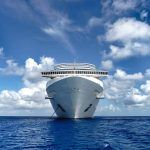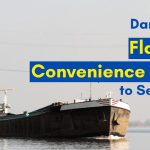Seafarers are vital to all of us. They travel the globe with everything we need, from bananas, oil, gas and building materials to cloth, grain and frozen meat. They are also an invisible labour force. What goes on at sea is often out of sight of regulators. This allows rogue ship owners to get away with abusing seafarers’ rights without detection.

The ITF has a powerful influence on the wages and conditions of seafarers working on ships flying flags of convenience (FOCs).
What are flags of convenience?
A flag of convenience ship is one that flies the flag of a country other than the country of ownership. For workers onboard, this can mean:
· very low wages
· poor on-board conditions
· inadequate food and clean drinking water
· long periods of work without proper rest, leading to stress and fatigue
By ‘flagging out’, ship owners can take advantage of:
· minimal regulation
· cheap registration fees
· low or no taxes
· freedom to employ cheap labour from the global labour market
The ITF believes there should be a ‘genuine link’ between the real owner of a vessel and the flag the vessel flies, in accordance with the United Nations Convention on the Law of the Sea (UNCLOS). FOC registries make it more difficult for unions, industry stakeholders and the public to hold ship owners to account.
In many cases, the registries themselves are not even run from the country of the flag.
Globalisation has helped to fuel this rush to the bottom. In a competitive shipping market, FOCs lower fees and minimise regulation, as ship owners look for the cheapest way to run their vessels.
Problems for seafarers
Contractual claims
A serious injury can ruin a life, end a seafaring career and rob a family of a regular income. On their own, seafarers have little chance of winning compensation. The ITF and its affiliated unions help seafarers pursue these cases through the courts, but often they must unravel complex company structures before they can work out who has responsibility for the ship and its crew.
Getting paid
Every day, the ITF hears about crews who are owed large sums of money. Some crews simply aren’t paid. Those that are find that companies delay, or fail to make, payments to their families when they want to send money home. In many cases, months go by without any sign of the money promised to seafarers. With no pay, they cannot even afford to escape and make their own way home. One of the most important aspects of the ITF inspectors’ work is gaining backpay for seafarers. From 2011-2013, USD103 million has been recovered by the ITF for crew who had not been paid – an average of USD34.3 million a year. Many FOC vessels are now covered by ITF agreements, giving direct protection to more than 250,000 seafarers.
Voicing their needs
Despite the hardships, many FOC seafarers are too frightened to protest. Unscrupulous manning agents circulate the names of seafarers who complain to inspectors. It is still common practice for a ship’s captain to write ‘ITF troublemaker’ in a seafarer’s discharge book. With such a mark on their record, a seafarer may never be employed again. Some seafarers have even been jailed on returning home. And with even more cheap sources of labour opening up – notably China – conditions and pay risk becoming worse.
The role of the ITF
The ITF negotiates agreements with international organisations, including maritime employers and manning agencies, to secure minimum standards and conditions for larger groups of seafarers.
Our Mexico City policy, adopted at the ITF congress in 2010, commits our affiliated unions to provide all seafarers with proper union representation and protection. They work together to provide collective agreement coverage for all seafarers, irrespective of their nationality or country of origin.
Politically:
We seek an international governmental agreement that there be a genuine link between the flag a ship flies and the nationality or residence of its owners, managers and seafarers. This would eliminate the flag of convenience system entirely
Industrially:
We try to ensure that seafarers who serve on FOC ships, whatever their nationality, are protected from exploitation by ship owners
The industrial campaign has succeeded in enforcing decent wages and conditions on board nearly 11,500 FOC ships. The ITF has become the standard-bearer for exploited and mistreated seafarers, irrespective of nationality or trade union membership. Every year, millions of dollars are recovered by the ITF and its affiliated unions in backpay and in compensation for death or injury on behalf of seafarers who have nowhere else to turn.
The ITF-approved collective agreements
ITF-approved collective agreements set the wages and working conditions for all crew on FOC vessels, irrespective of nationality. All vessels covered by an ITF-approved agreement get a certificate, which signifies the agreed wages and working conditions on board.
There are different types of agreements reflecting the complexity of industry cruise and offshore agreements and the differences between regions.
Inspections
More than 150 ITF inspectors and contacts in ports throughout the world ensure compliance with our agreements. ITF inspectors are union officials who are either full time or part time, working directly with the ITF.
They monitor the payment of wages and other social and employment conditions. If necessary, they take action to enforce ITF policy.
Working with dockers
The fair practices committee (FPC) is made up of both seafarers and dockers’ unions. Between the FPC meetings every second year, the elected FPC Steering Group reviews the day-to-day running and effectiveness of the flags of convenience campaign.
Seafarers’ and dockers’ unions work together to support safe and quality workplaces for all port workers. In many countries, port workers face the consequences of privatisation: casual and precarious work, inadequate training and violations of their freedom of association. To address those issues, the ITF port of convenience campaign was initiated.


